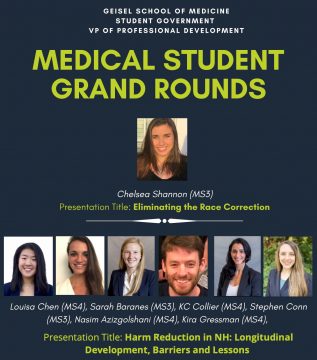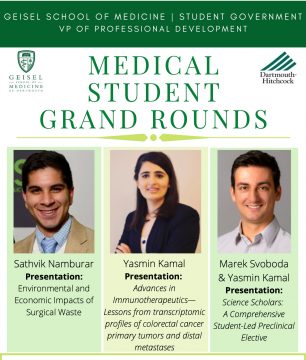This fall marked the start of Medical Student Grand Rounds, a monthly series of talks by Geisel School of Medicine students for an audience of their peers and interested medical faculty. Organized by Geisel’s Student Government, the presentations showcase the breadth of student knowledge, passions, and research at the institution.
Across academic medical centers, grand rounds remain an important educational activity for doctors to share medical knowledge in a formal presentation. Many healthcare professionals rely on grand rounds to stay up to date in important, evolving, or nascent areas that may be outside of their core practice.
To cultivate academic leaders, the faculty at Geisel have entrusted this time-honored tradition to medical students.
Led by third-year Geisel student Falen Demsas ’22, student government Vice President of Professional Development, the innovation looks to get the full benefit of the observations of medical trainees. “As medical students, we have a lot to learn,” explains Demsas, “but we also have a lot to share about the impactful work we have engaged in.”
Demsas says the goal is to create a platform for students to formally discuss issues that, at first, may seem to fall outside the traditional scope of medical research and thus fail to be adequately represented in medicine—such as harm reduction, systemic racism, health inequities, public policy, and curricular changes. Not only do some of these subjects receive less attention at regional or national medical conferences, they do not typically feature student voices.
Many students at Geisel engage passionately in the study of these topics, a unique vantage that Medical Student Grand Rounds looks to leverage. “The talks provide a space to acknowledge and share the work already accomplished by Geisel students in their local, national, and global communities,” she says.
 Kicking off the series was a presentation by third- and fourth-year Geisel students on their local efforts in harm reduction with Project 439, a student-led effort to make syringe services and other harm reduction tools available in Claremont, New Hampshire. Nasim Azizgolshani ’21, Sarah Baranes ’22, Louisa Chen ’21, KC Collier ’21, Stephen Conn ’22, and Kira Gressman ’22 shared insights from the longitudinal development of this community initiative, now known as Geisel Students for Harm Reduction, including how the project has been sustained by new student leadership since its start four years earlier.
Kicking off the series was a presentation by third- and fourth-year Geisel students on their local efforts in harm reduction with Project 439, a student-led effort to make syringe services and other harm reduction tools available in Claremont, New Hampshire. Nasim Azizgolshani ’21, Sarah Baranes ’22, Louisa Chen ’21, KC Collier ’21, Stephen Conn ’22, and Kira Gressman ’22 shared insights from the longitudinal development of this community initiative, now known as Geisel Students for Harm Reduction, including how the project has been sustained by new student leadership since its start four years earlier.
“The grand rounds are a great opportunity to establish new connections with other students or faculty who might be interested in the same subject area,” says Marek Svoboda MD-PhD ’23, who presented on his experience as co-director of Geisel’s Science Scholars alongside Yasmin Kamal MD-PhD ’22. Svoboda, who mentors preclinical students about research opportunities at Geisel, says he sees Medical Student Grand Rounds as a springboard for future collaborations.
With fewer opportunities to gather in person this year, the regularly occurring forum lends more visibility to the significant work happening on campus. “These dynamics are even more apparent in COVID times,” adds Conn, “when our distance makes it more difficult to highlight and elevate the achievements of our peers.”
All of the presenters said they were impressed by how many classmates, faculty, and alumni tuned in for the student-led talks.
“The idea is brilliant,” says Roshni Pinto-Powell, MD, professor of medical education and associate dean for admissions at Geisel. “I have attended every single one and have spread the word at Dartmouth-Hitchcock Medical Center to ensure that my colleagues can share in the learning.”
Pinto-Powell says the new effort flows from the school’s commitments to intellectual inquiry, teaching, and service. “I am all too aware of the outstanding service and scholarship our students engage in during their years at Geisel,” she says. “Giving them a forum to spread the word about their work to the community at large was exactly what was needed.”
 Medical Student Grand Rounds invites participation by any interested student. Presenters apply for a slot in advance, and a separate form allows classmates to nominate a peer to give a talk.
Medical Student Grand Rounds invites participation by any interested student. Presenters apply for a slot in advance, and a separate form allows classmates to nominate a peer to give a talk.
Kamal attributes the success of Medical Student Grand Rounds to Geisel’s collegial research environment. “The diverse interests of the audience encourage you think about your work from a different angle or perspective that you may not have gotten elsewhere,” says Kamal, who also presented her scientific research on the immune signaling pathways that characterize colon cancer subtypes.
In addition to sharing their achievements, students benefit from the task of sustaining their original thoughts aloud, before an audience. “It is important to present and receive feedback on your research from a new audience, especially one as diverse as the medical student body,” Svoboda says.
“It is great practice for down the road as residents and fellows when we present our research to the broader clinical community and discuss the impact of the work we are doing,” echoes Kamal.
A time-honored activity, grand rounds are a modern example of Socratic dialogue whereby a group of learners is guided by an expert to a precise answer to a puzzling matter.
“I thought the forum inspired serious, substantive, student-driven discussion between faculty and students,” commented Sathvik Namburar ’22, who presented his work on the environmental and economic impacts of surgical waste. Listeners relied on Namburar not just for his research, which he undertook at India’s Aravind Eye Hospital, but also his insights into the industry and regulatory changes that could address the issues that his talk framed.
“I look forward to hearing how their projects unfolded with time and the lessons learned. It is wonderful to see how our students grow, flourish and mature as scholars and educators,” Pinto-Powell says.